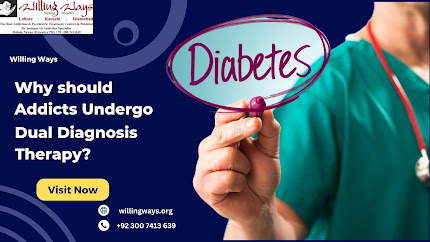All about the Hydrocodone Addiction | Willing Ways Karachi
Hydrocodone is supplied in tablet at the best addiction treatment center in Karachi form for oral administration. The drug is an opioid analgesic and antitussive used to treat chronic pain and dry cough. The dose of hydrocodone is adjusted, and How Service Dogs Are Helping PTSD is according to the severity of pain and the patient's response. Because of the high probability of abuse, diversion, and hydrocodone addiction, the drug is a controlled substance available legally only by prescription from a medical professional.
There have been frequently reported
adverse reactions to the use of hydrocodone, which include, but are not limited
to, the following:
- Lightheadedness
- Dizziness
- Sedation
- Vomiting
- Nausea
- Drowsiness
- Mental confusion
- Lethargy
- Anxiety
- Fear
- Physical dependence
- Mood swings
- Constipation
- Hearing impairment or loss (in users who experience chronic overdose)
- Respiratory depression
- Urinary retention
Hydrocodone addiction is a chronic,
neurological disease with genetic, psychosocial, and environmental factors that
influence the prevalence of occurrence. Addiction is characterized by one or
more of the following traits; inability to control drug use, compulsive using,
and continuing to use despite danger and cravings.
Drug-seeking behavior is also
typical for someone who has a hydrocodone addiction. Drug-seeking behavior
patterns include:
- Unnecessary emergency room visits.
- Doctor shopping.
- Refusing to submit to an appropriate medical examination.
- Repeated excuses of losing or having a prescription stolen.
- Tampering with drugs.
- The reluctance to provide access to medical records.
Hydrocodone addiction and abuse
significantly differ from physical dependence and tolerance. Hydrocodone
physical dependence can develop after several weeks of use, but it can also develop
within days of opioid therapy. Tolerating hydrocodone necessitates taking an
ever-increasingly larger dose to achieve the same withdrawal symptoms.
Doctors should always conduct a
proper patient assessment, observe acceptable prescription practices, show
periodic therapy reviews, and keep up-to-date patient records due to the rise
in hydrocodone addiction. As a Schedule III controlled substance, hydrocodone
is susceptible to black market diversion and has a high likelihood of
dependence. The drug is popular among users with addiction disorders and is one
of the most commonly abused prescription medications.
There is a severe risk of overdose
for people who misuse hydrocodone. Such signs and symptoms of an overdose
include the following:
- Respiratory depression
- Somnolence
- The stupor progressing into a coma
- Skeletal muscle flaccidity
- Cold and clammy skin
- Apnea
- Bradycardia (slowed heart rate)
- Hypotension (low blood pressure)
- Renal tubular necrosis
- Hepatic necrosis
- Vomiting
- Circulatory collapse
Hydrocodone addiction is a severe
medical condition and a progressive disease that can be fatal if left
untreated. The most effective treatment methods for a hydrocodone addiction are
medical care, detoxification, therapy, counseling, and rehabilitation.
If you or someone you love is facing
an addiction to hydrocodone, knowing you are not alone is essential. Help is
available; please get in touch with us today for more information.




Comments
Post a Comment